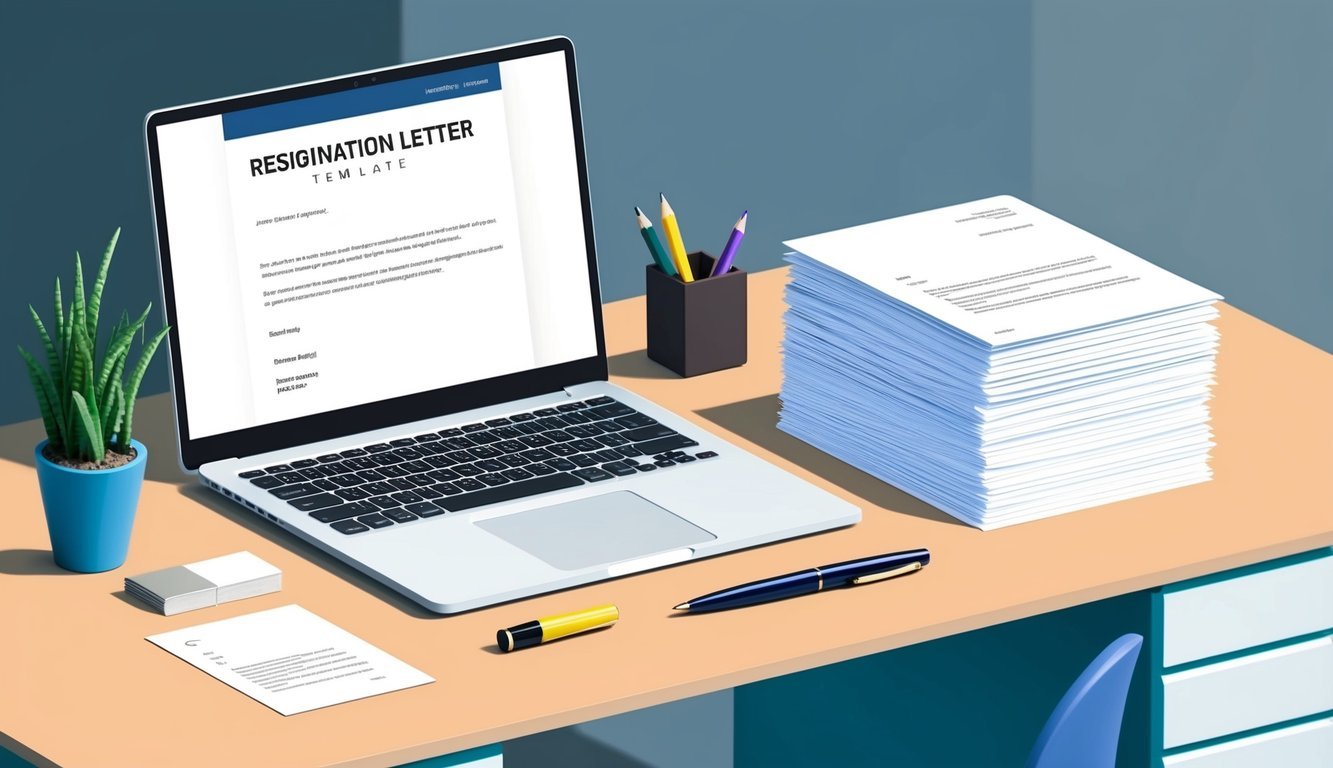When you decide to move on from your current position in the nursing field, you need to write a professional nursing resignation letter.
This letter not only communicates your intent to resign, but also sets the tone for your future career opportunities.
A well-crafted resignation letter can leave a lasting impression, ensuring that you part on good terms with your employer.
As a nurse, you play a vital role in patient care.
Your decision to leave a nursing job can have significant implications for your career path.
Taking the time to write a thoughtful nurse resignation letter can facilitate a smoother transition and demonstrate your professionalism.
By including key elements such as your intention to resign, your last working day, and appreciation for your experience, you can maintain positive relationships in the healthcare community.
To effectively navigate your resignation, consider following specific templates and guidelines that outline what to include and how to format your letter.
Resources like Nurse.org provide invaluable tips on crafting your letter, ensuring that you present your decision clearly while expressing gratitude for your time spent in your role.
Preparing to Write Your Resignation Letter
When you decide to write your resignation letter, you need to prepare yourself.
Understanding your reasons for leaving and determining your last day of work are critical aspects of this process.
These elements not only help you craft a professional letter, but also facilitate a smoother transition.
Understanding Reasons for Resignation
Identifying your reasons for resigning is paramount.
This clarity will guide how you frame your letter and can help you maintain professionalism.
Common reasons include:
- Career Advancement: Moving on for a better opportunity.
- Personal Circumstances: Family issues or health considerations.
- Job Satisfaction: Seeking a more fulfilling work environment.
When you articulate your reasons, you can choose whether to include them in your resignation letter.
While expressing motivation can be helpful, be cautious not to voice grievances, as this might damage future relationships.
A concise, respectful note is often best.
Setting the Last Day of Work
Determining your last day of work is crucial for both you and your employer.
Typical notice periods in nursing are two weeks, but consider the following:
- Contractual Obligations: Check your contract for specific requirements regarding notice.
- Employer Needs: Assess your workplace’s need for a transition period to ensure continuity.
Once you set a date, communicate it clearly in your resignation letter.
State the last day prominently, and say it respectfully.
For example, “My last day of work will be [insert date].” This formal notice maintains professionalism and supports a positive exit from your nursing job.
Writing Your Resignation Letter
Crafting a professional resignation letter is crucial for maintaining good relationships when leaving your nursing position.
The letter should include a clear structure with an appropriate opening, detailed body content, and a formal closing.
Constructing a Professional Opening
Start your letter with your contact information at the top, including your name, address, phone number, and email.
This should be followed by the date and the recipient’s details.
Using a formal letterhead enhances professionalism.
For the opening, clearly state that this letter serves as your formal resignation.
Mention your position and include the effective date of your resignation, typically two weeks from delivery.
Here’s a quick example:
Your Name
Your Address
City, State, Zip
Email
Phone Number
[Date]
Manager's Name
Hospital/Clinic Name
Hospital Address
City, State, Zip
Drafting the Body of the Letter
In this section, express gratitude for the experiences you gained while working at the facility.
Be concise and maintain a positive tone.
It’s essential to specify your last working day and offer assistance during the transition.
This demonstrates professionalism and goodwill.
You can mention reasons for your departure if you feel comfortable, such as pursuing further education or a new career opportunity.
The body should be straightforward without unnecessary details.
A simple format could look like this:
- Thank the management and colleagues.
- State your reasons briefly (optional).
- Offer to help during the transition.
Concluding with a Formal Sign-Off
Your resignation letter should end with a formal sign-off.
Use phrases such as “Sincerely,” or “Kind regards,” followed by your signature and printed name.
Ensure that the closing reflects your professionalism.
If you’re sending an email, consider adding your printed name right below your signature.
This closure can reinforce the respectful tone of your message.
Here’s a sample:
Thank you for the opportunities during my time with [Hospital/Clinic Name].
Sincerely,
[Your Signature]
Your Name
Using a template can simplify the process of drafting your letter.
Refer to resources for sample resignation letters and formal resignation templates to guide you.
Communicating Your Resignation
Effectively communicating your resignation is vital for maintaining professionalism as you transition to a new opportunity.
Your approach can impact your relationships within your healthcare organization and facilitate a smoother exit.
Selecting the Mode of Communication
When resigning from a nursing job, consider how you will communicate your decision.
The most common methods are in person, through a resignation letter, or via a resignation email.
-
In Person: Scheduling a face-to-face conversation with your supervisor is often the most respectful method. This allows for an open dialogue where you can explain your reasons for leaving.
-
Resignation Letter: A formal resignation letter should accompany your in-person discussion. It provides a clear record of your intentions and helps ensure a smooth transition.
-
Resignation Email: If an in-person meeting isn’t feasible, a resignation email is a valid alternative. Make sure to keep it professional. Include the effective date and any necessary details.
For a resignation email sample, consider reviewing a nurse resignation email example for guidance.
Ensuring a Smooth Transition

Ensuring a smooth transition when resigning from a nursing position is essential for maintaining professionalism.
Here are key steps to consider:
-
Notify Early: Inform your supervisor about your resignation at least two weeks before your last day of work. This courtesy allows ample time for your healthcare organization to find a replacement.
-
Submit a Formal Resignation Letter: Write a clear and concise resignation letter. Here is a simple template:
| Part of Letter | Content |
|---|---|
| Date | [Insert date] |
| Address | [Supervisor’s Name, Healthcare Org] |
| Greeting | Dear [Supervisor’s Name], |
| Body | Effective [last working day], I resign from my position. Thank you for the opportunities. |
| Closing | Sincerely, [Your Name] |
-
Offer to Help with the Transition: Show willingness to assist in training your replacement or documenting your duties.
This gesture fosters goodwill.
-
Organize Your Work: Make sure all your patient records are up to date.
This will help your colleagues understand ongoing cases easily.
-
Communicate with Colleagues: Inform your team about your impending departure.
Acknowledging their support will help maintain relationships.
By taking these steps, you can leave your current role on positive terms while supporting your healthcare organization and colleagues.
For more guidance, you can refer to Empuls.
Sample Nursing Resignation Letters
Writing a resignation letter is a crucial part of leaving your nursing position.
Here are some sample formats to guide you.
Basic Resignation Letter
| Element | Example |
|---|---|
| Date | [Insert Date] |
| Your Information | [Your Name] |
| [Your Address] | |
| [City, State, Zip] | |
| Recipient Info | [Manager’s Name] |
| [Facility Name] | |
| [Facility Address] |
Body:
Dear [Manager’s Name],
I am writing to formally resign from my position as [Your Job Title] at [Facility Name], effective [Last Working Day].
I appreciate the opportunities I have had during my time here.
Sincerely,
[Your Name]
RN Resignation Letter Sample
| Element | Example |
|---|---|
| Subject Line | Resignation – [Your Name] |
| Opening | Dear [Manager’s Name], |
| Message | I am resigning from my role as an RN, effective [Date]. Thank you for your support. |
Consider including your contact information for future communication.
For more detailed templates, you can refer to these resources: Nursing Resignation Letters or Sample Resignation Letters.

